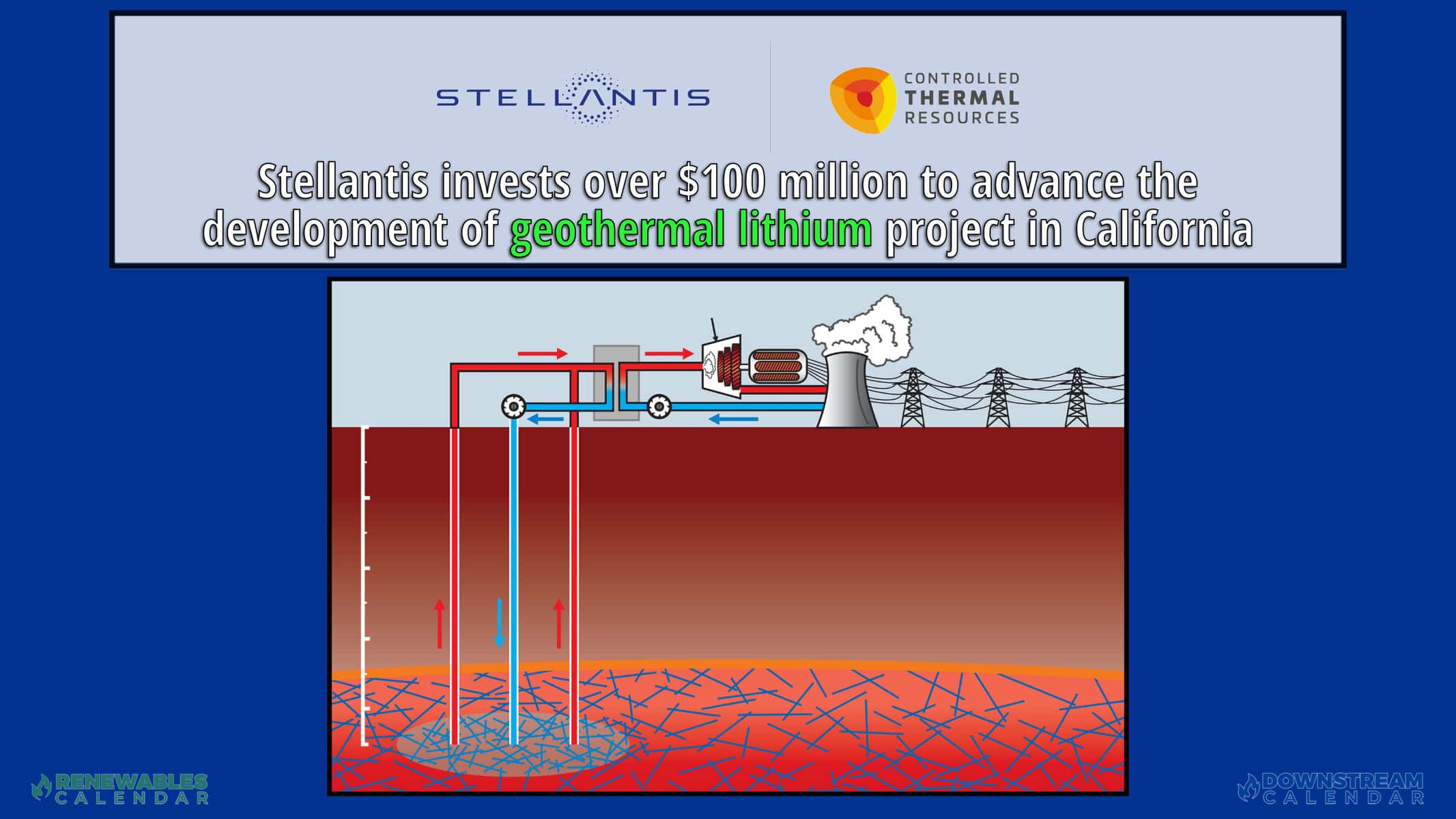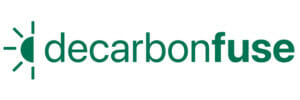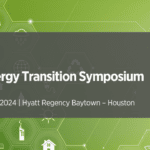- Stellantis invests over $100 million to advance the development of geothermal lithium project in California and encourage decarbonization of battery electric vehicle supply chains
- New agreement includes a supply increase from the initial plan of 25,000 metric tons to up to 65,000 metric tons per year of battery-grade lithium hydroxide monohydrate
- CTR’s integrated production process employs modular engineering design for efficient scale-up, minimizing environmental impacts and carbon emissions
- Sustainable lithium hydroxide supply will support Stellantis’ U.S. product offensive and Dare Forward 2030 plan of having more than 25 all-new battery electric vehicle (BEV) launches and 50% BEV sales by 2030
AMSTERDAM – Stellantis N.V. and Controlled Thermal Resources Holdings Inc. (CTR) today announced a major investment of over $100 million from Stellantis to advance the development of CTR’s Hell’s Kitchen project, the world’s largest geothermal lithium project with a total resource capacity to produce up to 300,000 metric tons of lithium carbonate equivalent each year. Lithium produced at Hell’s Kitchen will support Stellantis vehicles’ BEV eligibility for consumer incentives under the U.S. Inflation Reduction Act (IRA).
Additionally, the companies expanded the initial supply agreement, which now calls for CTR to supply up to 65,000 metric tons of battery-grade lithium hydroxide monohydrate (LHM) each year over a 10-year contract term. This new agreement incorporates the original lithium supply agreement signed by both companies in June 2022 for up to 25,000 metric tons of LHM per year.
CTR’s Hell’s Kitchen project in California’s Imperial County will recover lithium from geothermal brines using renewable energy and steam to produce truly “green” battery-grade lithium products in a fully integrated process. This eliminates the need for evaporation brine ponds, open pit mines and fossil-fueled lithium processing.
“The foundation of our industry-leading decarbonization drive includes low-emissions production and sustainable supply as the building blocks for our electric vehicles,” Stellantis CEO Carlos Tavares said. “The latest agreement with CTR is an important step in our care for our customers and our planet as we work to provide clean, safe and affordable mobility in North America.”
As part of the Dare Forward 2030 strategic plan, Stellantis announced plans of reaching a 100% passenger car BEV sales mix in Europe and 50% passenger car and light-duty truck BEV sales mix in the United States by 2030. To achieve these sales targets, the Company is securing approximately 400 GWh of battery capacity, supported by six battery manufacturing plants in North America and Europe. Stellantis is on track to become a carbon net zero corporation by 2038, all scopes included, with single-digit percentage compensation of remaining emissions.
“This substantial investment in CTR by Stellantis marks an outstanding milestone for our company and further solidifies our efforts to support sustainable electric vehicle battery production,” CTR Chief Executive Officer Rod Colwell said. “With electric vehicle adoption growing rapidly in the U.S. and throughout the world, it has never been more important to ensure battery materials are sourced and produced responsibly. Through localizing the battery supply chain, we can minimize supply chain risk and create thousands of jobs in a disadvantaged community. We applaud the leadership of Stellantis and look forward to working together to set new industry benchmarks for reliability, efficiency, and sustainability.”
CTR is scheduled to commence battery-grade lithium hydroxide monohydrate supply for Stellantis in 2027. The company expects to create 480 construction jobs through comprehensive project labor agreements and upward of 940 direct project jobs when the resource is fully developed.
STELLANTIS FORWARD-LOOKING STATEMENTS
This communication contains forward-looking statements. In particular, statements regarding future events and anticipated results of operations, business strategies, the anticipated benefits of the proposed transaction, future financial and operating results, the anticipated closing date for the proposed transaction and other anticipated aspects of our operations or operating results are forward-looking statements. These statements may include terms such as “may”, “will”, “expect”, “could”, “should”, “intend”, “estimate”, “anticipate”, “believe”, “remain”, “on track”, “design”, “target”, “objective”, “goal”, “forecast”, “projection”, “outlook”, “prospects”, “plan”, or similar terms. Forward-looking statements are not guarantees of future performance. Rather, they are based on Stellantis’ current state of knowledge, future expectations and projections about future events and are by their nature, subject to inherent risks and uncertainties. They relate to events and depend on circumstances that may or may not occur or exist in the future and, as such, undue reliance should not be placed on them.
Actual results may differ materially from those expressed in forward-looking statements as a result of a variety of factors, including: the impact of the COVID-19 pandemic, the ability of Stellantis to launch new products successfully and to maintain vehicle shipment volumes; changes in the global financial markets, general economic environment and changes in demand for automotive products, which is subject to cyclicality; changes in local economic and political conditions, changes in trade policy and the imposition of global and regional tariffs or tariffs targeted to the automotive industry, the enactment of tax reforms or other changes in tax laws and regulations; Stellantis’ ability to expand certain of their brands globally; its ability to offer innovative, attractive products; its ability to develop, manufacture and sell vehicles with advanced features including enhanced electrification, connectivity and autonomous-driving characteristics; various types of claims, lawsuits, governmental investigations and other contingencies, including product liability and warranty claims and environmental claims, investigations and lawsuits; material operating expenditures in relation to compliance with environmental, health and safety regulations; the intense level of competition in the automotive industry, which may increase due to consolidation; exposure to shortfalls in the funding of Stellantis’ defined benefit pension plans; the ability to provide or arrange for access to adequate financing for dealers and retail customers and associated risks related to the establishment and operations of financial services companies; the ability to access funding to execute Stellantis’ business plans and improve its businesses, financial condition and results of operations; a significant malfunction, disruption or security breach compromising information technology systems or the electronic control systems contained in Stellantis’ vehicles; Stellantis’ ability to realize anticipated benefits from joint venture arrangements; disruptions arising from political, social and economic instability; risks associated with our relationships with employees, dealers and suppliers; increases in costs, disruptions of supply or shortages of raw materials, parts, components and systems used in Stellantis’ vehicles; developments in labor and industrial relations and developments in applicable labor laws; exchange rate fluctuations, interest rate changes, credit risk and other market risks; political and civil unrest; earthquakes or other disasters; risks and other items described in the Company’s Annual Report on Form 20-F for the year ended December 31, 2022 and Current Reports on Form 6-K and amendments thereto filed with the SEC; and other risks and uncertainties.
Any forward-looking statements contained in this communication speak only as of the date of this document and Stellantis disclaims any obligation to update or revise publicly forward-looking statements. Further information concerning Stellantis and its businesses, including factors that could materially affect Stellantis’ financial results, is included in Stellantis’ reports and filings with the U.S. Securities and Exchange Commission and AFM.
About Stellantis
Stellantis N.V. (NYSE: STLA / Euronext Milan: STLAM / Euronext Paris: STLAP) is one of the world’s leading automakers and a mobility provider. Its storied and iconic brands embody the passion of their visionary founders and today’s customers in their innovative products and services, including Abarth, Alfa Romeo, Chrysler, Citroën, Dodge, DS Automobiles, Fiat, Jeep®, Lancia, Maserati, Opel, Peugeot, Ram, Vauxhall, Free2move and Leasys. Powered by our diversity, we lead the way the world moves – aspiring to become the greatest sustainable mobility tech company, not the biggest, while creating added value for all stakeholders as well as the communities in which it operates. For more information, visit www.stellantis.com.
About CTR
Through its project companies, Controlled Thermal Resources Holdings Inc. (CTR) specializes in critical minerals, battery-grade lithium chemicals, and renewable energy production with projects in advanced development in the United States. CTR’s leadership team has successfully developed and managed geothermal operations in California’s Salton Sea region for 30+ years. This highly specialized, location-specific knowledge has been instrumental in advancing CTR’s projects. Construction is expected to commence on Hell’s Kitchen – Stage 1 in late 2023. CTR is committed to delivering sustainable, low-cost lithium products and renewable power to support clean energy initiatives and to ensure a domestic, socially responsible lithium product supply chain in the United States. For more information, visit www.cthermal.com.




